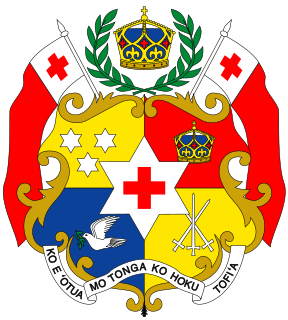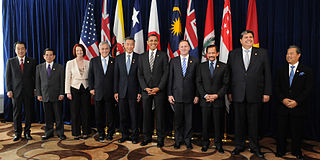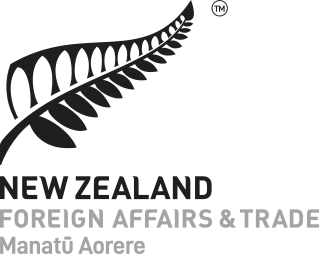
The foreign relations of New Zealand are oriented chiefly toward developed democratic nations and emerging Pacific economies. The country’s major political parties have generally agreed on the broad outlines of foreign policy, and the government has been active in promoting free trade, nuclear disarmament, and arms control.

The Samoan Government is generally conservative and pro-Western, with a strong interest in regional political and economic issues. Samoa participated in a first round of negotiations with its Pacific Island neighbors for a regional trade agreement in August 2000. In January 2009, Samoa opened embassies in China and Japan.

The Pacific Islands Forum (PIF) is an inter-governmental organization that aims to enhance cooperation between countries and territories of the Pacific Ocean. It was founded in 1971 as the South Pacific Forum (SPF), and changed its name in 1999 to "Pacific Islands Forum", so as to be more inclusive of the Forum's Oceania-spanning membership of both north and south Pacific island countries, including Australia. It is a United Nations General Assembly observer.

This article is about the foreign relations of Tuvalu.

Tonga, by a modification of its treaty of friendship with the United Kingdom in July 1970, is responsible for its own external affairs. It maintains cordial relations with most countries and has close relations with its Pacific neighbours and the United Kingdom. In 1998, it recognized the People's Republic of China and broke relations with Taiwan.

The Trans-Pacific Partnership (TPP), also called the Trans-Pacific Partnership Agreement, was a proposed trade agreement between Australia, Brunei, Canada, Chile, Japan, Malaysia, Mexico, New Zealand, Peru, Singapore, Vietnam, and the United States signed on 4 February 2016, which was not ratified as required and did not come into effect. After the newly elected US president Donald Trump withdrew the US signature from TPP in January 2017, the agreement could not enter into force. The remaining countries negotiated a new trade agreement called Comprehensive and Progressive Agreement for Trans-Pacific Partnership, which incorporates most of the provisions of the TPP and which entered into force on 30 December 2018.

The Ministry of Foreign Affairs and Trade (MFAT) is the public service department of New Zealand charged with advising the government on foreign and trade policy, and promoting New Zealand's interests in trade and international relations.
The Pacific Agreement on Closer Economic Relations (PACER) is an umbrella agreement between members of the Pacific Islands Forum which provides a framework for the future development of trade cooperation.

The China–New Zealand relations, sometimes known as Sino–New Zealand relations, refers to the relations between China and New Zealand. New Zealand recognised the Republic of China after it lost the Chinese Civil War and retreated to Taiwan in 1949, but switched recognition to the People's Republic of China on 22 December 1972. Since then, economic, cultural, and political relations between the two countries have grown over the past four decades. China is New Zealand's largest trading partner in goods and second largest trading partner in services. In 2008, New Zealand became the first developed country to enter into a free trade agreement with China. In recent years, New Zealand's extensive economic relations with China has been complicated by its security ties to the United States.
The New Zealand–China Free Trade Agreement is a bilateral free trade agreement signed between the People's Republic of China and New Zealand in April 2008. It is the first free trade agreement that China has signed with any developed country, and New Zealand's largest trade deal since the 1983 Closer Economic Relations agreement with Australia. The New Zealand-China FTA was signed on 7 April 2008 in Beijing, after negotiations that spanned fifteen rounds over three years. It entered into force on 1 October 2008, after ratification by the New Zealand Parliament. The provisions of the agreement are expected to be phased in gradually over 12 years, fully coming into force in 2019.

New Zealand is party to several free-trade agreements (FTAs) worldwide.

The Trans-Pacific Strategic Economic Partnership Agreement (TPSEP) is a trade agreement between four Pacific Rim countries concerning a variety of matters of economic policy. The agreement was signed by Brunei, Chile, Singapore and New Zealand in 2005 and entered into force in 2006. It is a comprehensive trade agreement, affecting trade in goods, rules of origin, trade remedies, sanitary and phytosanitary measures, technical barriers to trade, trade in services, intellectual property, government procurement and competition policy. Among other things, it called for reduction by 90 percent of all tariffs between member countries by 1 January 2006, and reduction of all trade tariffs to zero by the year 2015.
The Comprehensive Economic Partnership for East Asia (CEPEA) is a Japanese led proposal for trade co-operation, free trade agreement, among the 16 present member countries of the East Asia Summit. All those movements and efforts were taken over by the following Regional Comprehensive Economic Partnership.
The Office of the Chief Trade Adviser (OCTA) is an independent trade advisory body of the Forum Island Countries. OCTA provides policy advice and capacity-building support to the Forum Island Countries, particularly in the Pacific Agreement on Closer Economic Relations (PACER) Plus trade negotiations with Australia and New Zealand. OCTA was established on 29 March 2010 and is based in Port Vila, Vanuatu. The first to be appointed to the Chief Trade Adviser position was Chris Noonan, an academic from New Zealand. Noonan resigned in September 2011. The OCTA Governing Board then appointed Julia Tijaja, the Trade Policy Adviser, as Caretaker Chief Trade Adviser in the interim until the new Chief Trade Adviser came on board. In February 2012, Edwini Kessie, an international trade law expert, was appointed the new Chief Trade Adviser. Kessie took up his post in June 2012. Thirteen Forum Island Countries are currently members of the OCTA; Cook Islands, Federated States of Micronesia, Kiribati, Nauru, Niue, Palau, Papua New Guinea, Marshal Islands, Samoa, Solomon Islands, Tonga, Tuvalu and Vanuatu. OCTA is fully owned and is under the exclusive control of its members.
Vangelis (Evangelos) Vitalis is a New Zealand diplomat and trade negotiator. Vitalis is also known as the first Greek-New Zealander to be appointed ambassador.
The Regional Comprehensive Economic Partnership (RCEP) is a proposed free trade agreement in the Asia-Pacific region between the ten member states of the Association of Southeast Asian Nations (ASEAN), namely Brunei, Cambodia, Indonesia, Laos, Malaysia, Myanmar, the Philippines, Singapore, Thailand, and Vietnam, and five of ASEAN's FTA partners—Australia, China, Japan, New Zealand, and South Korea. India, which is also ASEAN's FTA partner, opted out of RCEP in November 2019.
The negotiations for the Trans-Pacific Partnership Agreement were held between 12 countries between 2008 and 2015. The negotiations were aimed at obtaining an agreement between the Trans-Pacific Strategic Economic Partnership Agreement parties Brunei, Chile, Singapore and New Zealand, as well as the Australia and the United States.

The Comprehensive and Progressive Agreement for Trans-Pacific Partnership (CPTPP), also known as TPP11 or TPP-11, is a trade agreement between Australia, Brunei, Canada, Chile, Japan, Malaysia, Mexico, New Zealand, Peru, Singapore, and Vietnam. It evolved from the Trans-Pacific Partnership (TPP), which never entered into force due to the withdrawal of the United States. At the time of its signing, the eleven countries' combined economies represented 13.4 percent of the global gross domestic product, making the CPTPP the third largest free-trade area in the world by GDP after the North American Free Trade Agreement and European Single Market.

Kiribati–Spain relations are the bilateral and diplomatic relations between these two countries. The embassy of Spain in Wellington, New Zealand, is accredited for Kiribati.











